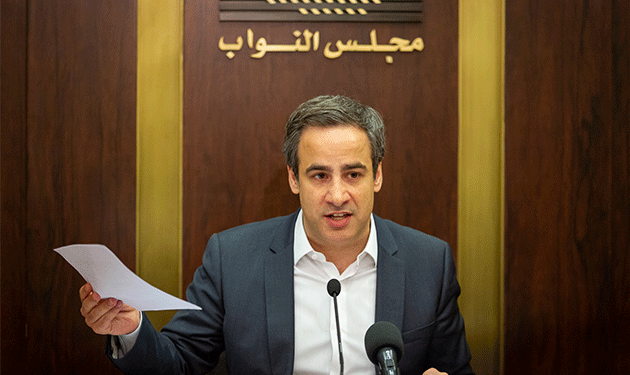The head of the “Independence Movement” MP Michel Moawad stated that the administration of the state that lies on the game of destroying institutions and transferring ministers to become kings over their ministries, since the nineties until today, is one of the main reasons that brought us to where we are today.
During a press conference from the House of Representatives, Moawad explained the reasons for submitting a bill proposal aiming at activating oversight and accountability of ministers and presidents, he said: “We have a minimum of 130 billion dollars in debt without having the basic services nor the least essentials of life, no roads, electricity or water neither clean environment nor aerial firefighting”. He added: “To be able to confront this debt, corruption, clientelism and that mentality that humiliated the Lebanese people and struck the economy, we must start from somewhere by developing a system of laws that facilitate oversight and accountability and fortify the independence of the authorities and institutions that apply these laws in order to strike the head of corruption.”
Moawad added: “Any government plans that are not paced with a system of laws and an independent judiciary system will not achieve any progress. What we need is a different governance, transparency, control and anti-corruption.”
This does not happen only with a set of laws but rather within a framework of a clear and integrated strategy, because fighting corruption along with the legal system to fight corruption is an interlinked matter, hence the importance of forming a parliamentary committee to put all these interrelated laws and endorse them by the committee in order to get approved by the General Assembly within a month in the committee and less thantwo months into the General Assembly. ”
Moawad refuted the reasons for proposing a law aimed at activating oversight and accountability of presidents and ministers, which he worked on in cooperation with former Minister Ghassan Mukheiber and which is based on the following dimensions:
First – Activating the legal oversight and accountability of subordinates, especially the general directors, on the legality of ministerial decisions, as one of the duties of the general manager when he sees any violation is to submit a letter to the minister and tell him about the violation but unfortunately what is happening today is the logic of “insistence and confirmation”which isone of the main reasons for random employment.
Second – activating the oversight and accountability carried out by the Central Audit and Inspection Bureau.According to the law establishing the supervisory bodies that currently exist, the powers of the supervisory bodies are limited only to public administrations, i.e. no powers over the minister, which constitutes a major obstacle to the formation of files and thus making it difficult to complete it, and he said: It is no longer acceptable to hold “small fishes” accountable without those big ones involved in corruption.
Third – activating financial responsibility, through the provisions of the law that considers that the minister is personally responsible for his own funds for every expense he holds, bypassing the credits open to his ministry with his knowledge of this abuse, as well as for every measure that leads to an increase in the expenses spent from the said credits, if this measure is not a result of previous legislative provisions, one of the reasons for not applying it, is the issue of the independence of the judiciary system, as it has a structural problem.
The first is that they added to this law the terms “with knowledge of this transgression” to allow the waiving of responsibility and this is what we have worked to abolish, secondly that the law does not identifythe side holding financial responsibility and recovering the stolen public funds.
Fourth- activating the penal (criminal) responsibility discussed by different parties and that was developed through the amended law number 18 according to the code of criminal procedures before the Lebanese high judicial council, which means the criminal acts stipulated in the penal laws and sanctions. The minister’s responsibility lies in his performance not in his corrupted actions. Therefore, we have excluded in the amendment of the code of the criminal procedures to prosecute ministers& presidents, all crimes related to corruption and thus, any minister or president will be transferred to an ordinary court of justice. We have adjusted few codes of criminal procedures such as the provisional arrest of a minister or a prime minister when he is still practicing his tasks; and he will be investigated only by the First Investigation judges.
Fifth- activating the procedural prosecution before the high judicial council.
Therefore, MP Moawad noted that Lebanon is suffering from an important problem concerning the laws and their application; the matter that made of any person in the executive authority protected, i.e. not subject to any judicial prosecution. Thus, we should start by changing laws, strengthening the judicial system to maintain its independence and its ability to implement these laws.
He said: “I ensure that Lebanese people will make the difference and they are invited today to be partners in this path to make laws within two months. And I will deploy all needed efforts to realize this goal in order to establish a real country based on strong institutions.”
At the end, MP Moawad addressed his colleagues and said: “we are standing in front of an historical responsibility to establish the country of strong institutions, and we are responsible of making the necessary change and to translate people’s demands into laws and reforms in the institutions. “







 العربية
العربية